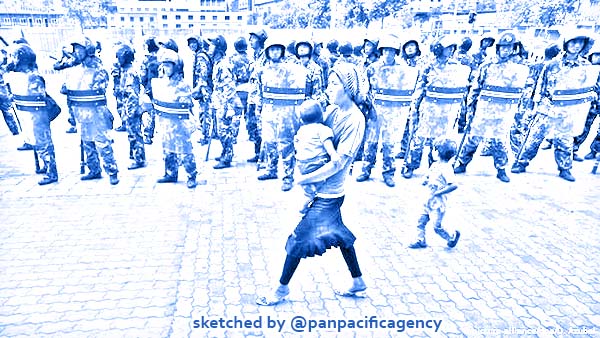US delays human rights sanctions targeting Xinjiang Production and Construction Corps

hundreds of thousands of ethnic Uighurs and Kazakhs have allegedly been locked up in "reeducation camps" in China's Xinjiang province. D.Azubel / DPA. Sketched by the Pan Pacific Agency.
BEIJING, Sep 25, 2020, SCMP. The US Treasury Department announced a two-month delay on human rights sanctions targeting Xinjiang Production and Construction Corps (XPCC), a Chinese paramilitary organisation in China’s northwest Xinjiang region that has been accused of rights violations against Uygurs and other Muslim ethnic minority groups there, South China Morning Post reported.
American companies had originally been given until September 30 to stop doing business with the XPCC, but with five days remaining until that deadline, the department said they will now have until November 30 to “wind down” their operations.
Xinjiang plays an outsize role in the world’s cotton and textile supply chain, and the XPCC – also known as the Bingtuan – controls many cotton farms and other components of the textile industry in the region, ranging from processing the raw cotton to selling American-made cotton-harvesting machines.
Experts say it is impossible to do business with China’s cotton and textile industries without also engaging with the XPCC in some way.
Boycott of Mulan urged by HK activist Joshua Wong as fresh anger sparked over filming in Xinjiang
Rights groups say the XPCC is responsible for human rights abuses in the region, including the use of forced labour in the cotton and textile industries. The Chinese government rejects those accusations and says the XPCC has contributed to Xinjiang’s economic development.
The delay, which will extend the grace period for companies until after November’s US elections, came amid calls from trade groups for such an extension.
Earlier this month, the Travel Goods Association (TGA), which lobbies for members of the travel retail industry, wrote to the Treasury asking for enforcement of the XPCC sanctions to be delayed until January, 2021.
Pushback against enforcement of the sanction came as the Trump administration faces criticism for scaling down a plan to ban certain imports from the whole of Xinjiang over forced labour concerns.
A blanket ban of cotton and tomatoes prepared by customs officials’ was replaced earlier this month with individual bans targeting five Chinese entities, prompting a backlash from labour rights groups and lawmakers who believe that anything short of a region-wide order will fail to insulate US supply chains from the risk of forced labour.
“These piece-meal actions fall far short of addressing a regional economic system that is built upon a foundation of forced labour and repression,” Representative James McGovern, Democrat of Massachusetts, said on the House floor earlier this week.
Separately on Friday, the Treasury Department also issued a clarification related to sanctions on certain Hong Kong government officials, including the city’s chief executive, Carrie Lam Cheng Yuet-ngor.
According to the department, if a Hong Kong official is sanctioned by the US, it does not mean the entire government agency where they work, or the entire Hong Kong government, is sanctioned as well.